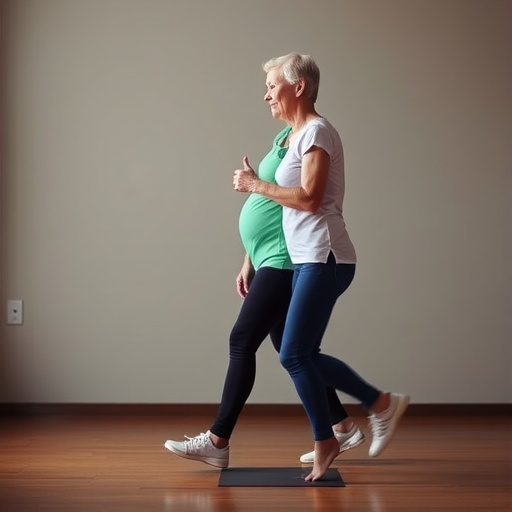In a transformative study that casts a spotlight on the pivotal role of physical activity among older adults, researchers Abdullah, Mathiyakom W., Asai T., and colleagues have unveiled significant findings on the balance, functional capacity, and overall quality of life in varying levels of physical activity. Published in BMC Geriatrics, the 2025 article brings to the forefront the often-overlooked importance of maintaining an active lifestyle as we age, suggesting that even modest increases in physical activity can lead to substantial improvements in health outcomes for seniors.
As the global population ages, concerns regarding the well-being and independence of older adults become increasingly pressing. The researchers aimed to elucidate the differences in health metrics between older adults who engage in lower levels of physical activity compared to their more active counterparts. The implications of their findings are vast, potentially informing public health policies and wellness programs geared towards fostering increased physical engagement among seniors.
The study methodically assessed participants through a combination of qualitative and quantitative measures designed to capture their balance capabilities, functional capacities, and overall life quality. The participants were stratified based on their physical activity levels—those considered active and those deemed inactive. This strategic grouping allowed for a clear comparison that would produce meaningful insights into the effects of physical engagement on health.
Researchers utilized advanced tools to evaluate balance, employing both dynamic and static assessments to discern how well participants maintained stability under various conditions. These measurements provided a nuanced understanding of the kinetic changes that accompany differing levels of physical engagement. The findings were telling; those who participated in regular, structured physical activities exhibited markedly better balance metrics, reducing their risk of falls—an ever-present danger for older adults.
Functional capacity was another critical focus of the study, with attention to activities of daily living that can drastically influence one’s quality of life. Participants undertaking higher intensity physical activities demonstrated enhanced capacity to perform these daily tasks—a revelation that underscores the necessity of a proactive approach to aging. This functional independence is not only vital for individual dignity but also reduces caregiver burdens, promoting a healthier family dynamic.
Quality of life, an inherently subjective measure, was assessed through validated scales that encompass various dimensions of well-being. The results were illuminating; those who were more physically active reported higher levels of satisfaction and contentment in their lives. Engaging in robust physical activity appeared to have a ripple effect, enhancing mental health, social engagement, and even emotional resilience. This holistic perspective on health during aging presents a compelling argument for encouraging physical activity amongst seniors.
The overarching conclusion drawn from the research posits that higher levels of physical activity correlate strongly with improved metrics of balance, functional capacity, and overall life quality. This correlation serves as a clarion call for stakeholders in health care and community planning to prioritize initiatives that promote physical activity among older adults. Innovative programs that blend exercise with social opportunities could significantly mitigate the risks associated with advanced age.
Furthermore, the authors advocate for tailored exercise regimens aimed at older adults, emphasizing that programs should be inclusive and adaptable. This may involve low-impact aerobics, strength training, and flexibility enhancement activities like yoga or tai chi, all structured to accommodate varying levels of mobility and health status. The goal should be to create environments where older adults feel empowered and motivated to engage in physical activity regularly.
As public health campaigns evolve to address the needs of an aging population, the insights gleaned from this study will likely shape future strategies. Communities could benefit from creating more accessible spaces for physical activity, including walking paths, community centers with fitness programs, and initiatives that encourage intergenerational engagement through physical activities.
Equally crucial is the role of healthcare providers in this paradigm shift. By integrating physical activity discussions into wellness check-ups and consultations, practitioners can foster a culture of movement. Endorsing active living should become a standard conversation topic, with healthcare professionals serving not only as advisors but as agents of change who encourage their patients to realize the myriad benefits of being physically active.
As this important research circulates within academic and policy-making communities, its potential to effect change cannot be underestimated. Ultimately, the study accentuates a fundamental truth: physical activity is not merely a luxury or an afterthought as we age but a cornerstone of what it means to live well and age gracefully.
In summary, this groundbreaking research significantly contributes to our understanding of the vital importance of physical activity in promoting balance, functional capacity, and quality of life among older adults. As we move towards a world where older adults comprise a significant segment of our population, it is imperative that communities and health professionals rally to support active aging initiatives. The evidence is clear; an active lifestyle can unlock the door to improved health outcomes, allowing older adults to enjoy their golden years with vitality and dignity.
Subject of Research: The impact of physical activity levels on balance, functional capacity, and quality of life in older adults.
Article Title: Comparison of balance, functional capacity, and quality of life between older adults with lower and higher levels of physical activity.
Article References:
Abdullah, Mathiyakom, W., Asai, T. et al. Comparison of balance, functional capacity, and quality of life between older adults with lower and higher levels of physical activity. BMC Geriatr 25, 786 (2025). https://doi.org/10.1186/s12877-025-06450-2
Image Credits: AI Generated
DOI: 10.1186/s12877-025-06450-2
Keywords: physical activity, older adults, balance, functional capacity, quality of life, health outcomes.




